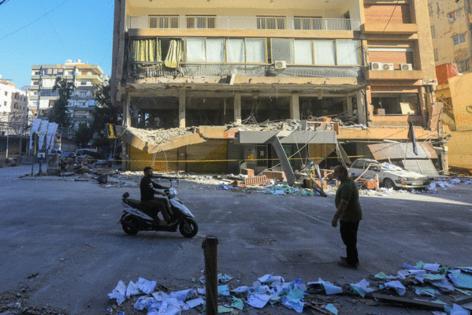US pushes for pre-election cease-fire in Lebanon, Gaza conflicts
Published in News & Features
U.S. officials traveled to the Middle East in a last-ditch effort to secure a cease-fire in Israel’s wars with Iran-backed Hezbollah and Hamas ahead of the presidential election early next month.
Secretary of State Antony Blinken is set to visit Israel and other countries starting Monday — his 11th trip to the region since the Israel-Hamas war started last October — while U.S. envoy Amos Hochstein landed in Beirut. Their mission will be to attempt to negotiate at least a pause in the multi-front conflict, which has seen fierce fighting between Israel and the two militant groups in both Lebanon and Gaza.
“We are either going to reach a solution or things are going to escalate out of control,” Hochstein told reporters on Monday after meeting Lebanon’s parliamentary speaker, Nabih Berri, a key interlocutor between the West and Hezbollah. Focus needs to be done to properly implement United Nations resolution 1701, he said, referring to the peace agreement put in place after Israel’s last war with Hezbollah in 2006.
Hochstein’s visit came after Israel widened its bombing campaign in Lebanon over the weekend, targeting financial institutions it says help fund Hezbollah’s military operations. The move to further degrade the militant group after weeks of air assaults and ground battles included at least 11 strikes on Beirut’s southern suburbs on Sunday, according to Lebanese media.
Israel has relentlessly targeted the area — where Hezbollah has a known presence — as well as towns and villages just over the border.
Hezbollah has been firing missiles into northern Israel since the start of the war in Gaza, and stepped up its barrage following Israel’s escalation.
U.S. President Joe Biden’s decision to send Hochstein this week “is signalling the urgency of a lasting cease-fire in Lebanon,” said Burcu Ozcelik, senior research fellow for Middle East security at the Royal United Services Institute in London. “Hezbollah and its backers in Iran are likely seeking a carefully orchestrated next step: how to deescalate to a threshold where Hezbollah will be able to salvage its weapons stockpiles and rank and file fighters.”
Package deal
An Israeli official told Bloomberg that, after more than a year of war, Israel is open to a package deal that would calm the front in southern Lebanon, release hostages held by Hamas in Gaza and allow more aid into the Palestinian territory.
Officials in the country have said they want resolution 1701 — which is supposed to keep Hezbollah away from the Israeli border — stringently implemented by Lebanese authorities and for U.N. peacekeepers to report more reliably on violations by the militant group.
But Israel has given no indication it will cease surveillance overflights in Lebanon — a breach of 1701 — and has indicated it wants the right to strike militarily if Hezbollah attempts to approach its border. That would enable the tens of thousands of Israelis who have left northern communities to feel safe enough to return home, a key objective of Israel’s escalation of military activities. About 1.2 million people in Lebanon are also displaced.
“The situation has to be that Hezbollah will lose the ability to threaten Israel, that Israel will cease fearing to respond,” Israeli Foreign Minister Israel Katz said in a weekend interview with the country’s Channel 14 TV.
Lebanese Prime Minister Najib Mikati has said that while there is no alternative to resolution 1701, it may be possible to agree to “new understandings that could govern” how it is implemented.
Both Hezbollah and Hamas are designated terrorist organizations by the U.S. and many other countries.
Israel’s security cabinet convened Sunday to discuss its retaliation against Iran for a missile attack almost three weeks ago, though the government made no announcement of what action it might take. The meeting ended with a statement that spoke only of a prospective deal to free hostages held by Hamas in Gaza.
“Among the goals of this war, at the highest levels, is the desire to leverage it for maximum success in returning the hostages,” Science Minister Gila Gamliel, a member of the security cabinet, told Israel’s Army Radio.
About 100 hostages are believed to be still in captivity in Gaza, a key sticking point to ending the war, although a number are assumed dead. Israeli forces have appeared to overrun Hamas at various points in the conflict, but have returned to the north of the territory in recent weeks to carry out more attacks.
Israel’s military killed Hamas leader Yahya Sinwar last week, prompting the U.S. and others to renew calls for a cease-fire after months of deadlock. Exploring ways to secure a breakthrough is likely to be high on Blinken’s agenda during his latest visit.
The conflict in Gaza began in October last year when Hamas attacked Israel, killing 1,200 people and abducting 250. More than 42,000 Palestinians have been killed in the yearlong war, according to the Hamas-run health ministry in the territory.
-------
(With assistance from Ethan Bronner and Omar Tamo.)
©2024 Bloomberg L.P. Visit bloomberg.com. Distributed by Tribune Content Agency, LLC.







Comments